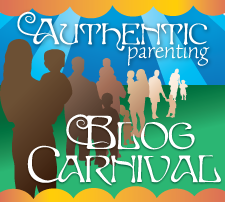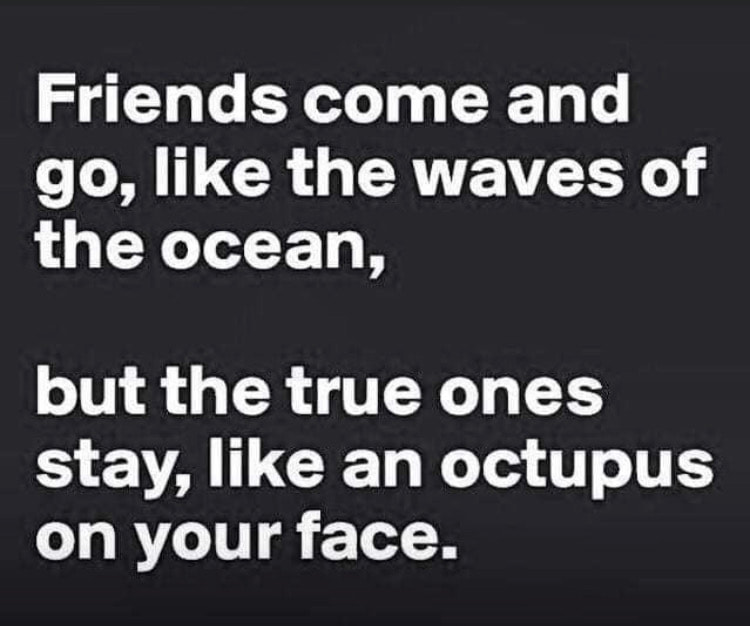|
The other night I read an article on Positively Positive, called "5 Rules for Life-Altering Dreaming". The only thing I didn't like about it was the word "rules" (me and rules don't mix so well anymore ;-) I thought it was actually really relevant to my last post about telling kids you "can't always get what you want". I have lots of thoughts on the word "realistic" too, but that is for another day. Anyways, the "rules" are actually outlining steps to a really powerful process for clarifying and declaring your dreams. So I did it right away. The first time I wrote it in my journal this is what I said: I dream of living in a vibrant, supportive community filled with loving people who share my values. I dream of working together, growing food, raising children, playing together, cooking and eating together, laughing and crying. As I read through the 5 steps outlined I realized that I was missing a very powerful part of the process. Writing my dream in the present tense. So I rewrote my paragraph to this: I live in a vibrant, supportive, growing community. We value peace, the earth, and compassion. We work and play together, cook and eat together, laugh and cry together. We grow together. Whoa. Just reading that makes me feel so good. When I was looking for a picture to add this to I found this one of my kids raking leaves with our best neighborhood friends last fall. It felt like the perfect image to add the words too. Writing my dream in the present tense was so powerful. Remembering that I already DO have many of these things is even better. I am a powerful creator in my own life. I can create the community I crave wherever I am. Yes I dream of even more - more community, more togetherness, more support, but appreciating what I already have while creating "more" feels even better.
I highly recommend trying this! It's fun and powerful. And letting others know what your dreams are is an essential step towards actually achieving your dreams. If you don't let people know then not only are you stopping yourself from taking steps towards your dream, but you may also be keeping away people and opportunities that you haven't even imagined yet. So go big! Declare your dreams. It feels good, I promise.
0 Comments
I had a total lightning bolt, epiphany moment today. I was taking part in a couple of wonderful conversations in one of my favorite private Facebook groups. One beautiful mama is struggling with postpartum depression. The love and support that flowed from the other women was almost palpable. And it came up more than once how we all wished we were closer so we could physically help this mother instead of just give her "virtual" support. The word "tribe" and "commune" came up and I was moved to tears.
I know that very recently I put forth the idea that maybe parenting isn't all that hard, and that we make a lot of the difficulty ourselves. I still think that is true. But I also think that parenting - especially mothering - is really, REALLY hard in the modern world. Especially in the first months and years when our babies are tiny and depend on others for EVERYTHING. A few neighborhood friends had babies recently and we chatted a few times in the first few months. Most of them were not first-time moms. One couple admitted that they questioned their sanity in adding another person to their family. I could completely understand where they were coming from. I flat out told the mom that the newborn months are all about survival. Especially when you have older children. It's just the truth. I have had a refrain in my head lately and it is, "The way we live is just not natural." We long for our tribe. I remember saying those exact words to my mother on the phone when Gerry was a newborn. I have a dream of starting a commune with like-minded families. It's like my own personal utopia. Let me tell you, I have not found a mom yet who thought I was crazy for this idea. Every single one of them either wants to sign up and join my commune or says, "oh yeah, I've thought of joining one too!" Men seem to be a little more hesitant. And I really think it's because they don't sense the urgency of our need. I know my husband doesn't. And here is where a positive attitude may actually be detrimental. Because I *do* love my life and have really embraced every step of our path so far, it's difficult for my husband to understand the depth of my need - for sisters surrounding me and other children mingling with ours. For someone to talk to. For more hands to help with food and other everyday activities. For camaraderie. For the natural flow of sharing life with others. I love the neighborhood we live in now. And we've been building up our own support network here: people to check in on our cats when we're away, and friends who bring me soup when I'm sick, lots of neighborhood kids that we play at the park with and have awesome parties with, a neighbor who is like Marisol's third grandmother. And I've learned a lot about how I can build up a supportive network - mostly by giving myself. Because the more I give the more I receive in return. Ideally we have our "tribe" established before we have children. People who live close to their families often already have a great foundation. But many women (and some men) find themselves very lonely when they bring home their first (or second, or third, or...) baby. Perhaps it is because we are so busy reveling in our freedom and independence when we are young adults and first married. I know I loved our first few years of marriage. We explored, traveled, shopped, worked, played, and relished our time together, just us. We got to see the world through our eyes as a new family. It was wonderful. Then BAM. We had a little baby and a whole new world opened up before our very eyes. We were responsible for this new little soul, who was completely dependent on us - and it was overwhelming and a little scary. When our first was just over one year old, we moved away from both of our families and struck out on our own. I was without a tribe. This is true for so many mothers. They are home alone with 1 or 2 (or 5 or 6) children with very little support. So I was thinking through all of these things this morning when it hit me. At a time when many mothers (or fathers) are really needing help themselves, children are pushed to be "independent" before they are ready. Whoa. There *has* to be a link there. Subconsciously how many moms are realizing they just can't do it all alone... and then they turn around and try to make their kids do "it" (whatever "it" may be) themselves? The lack of support given to mothers becomes a weight that is shifted to children, as we all try to cope with our (relatively) new "nuclear" way of living. And as quickly as this realization came I also knew that until we support our mothers the way *they* deserve to be, kids will not get the lives they deserve. Does this resonate with you at all? Please let me know what your thoughts are in the comments! Parenting is hard. It's the most difficult job you'll ever do. Parenting is challenging but rewarding. The message is everywhere and it is beat into our heads almost constantly. PARENTING IS HARD. Not only that, we reinforce it to one another often. But what if parenting *isn't* intrinsically difficult, we are just making it so? How many times have you seen a mama cat complain about motherhood - all those kittens suckling! And later she has to teach them to hunt - and they never even say thank you! Or a bird - does she ever complain that the babies are hungry *again*? Why do we as humans seem to believe that we have such a hard gig? Is it because we're smarter or more aware? I was mulling over this question a few months ago after reading some comments on one of my favorite blogs. Everyone was chiming in with their own stories and feelings about how difficult motherhood is. Some women admitted that they didn't even like babies; others said they couldn't wait until their kids were out of the house. And it just got my wheels turning. One thing that I've learned from teaching Hypnobabies is how powerful our minds are and that we create what we dwell upon. If the constant refrain in our lives is how difficult things are then we are likely to get a lot more choruses of... hard, Hard, HARD! I'm not saying that I can't relate to the stories all these mamas share. I can. I know sleepless nights and crying for almost no reason other then exhaustion. I know losing my patience and feeling guilty for it later. I know feeling extreme anxiety as my child gets more upset about something seemingly insignificant. I know feeling uncomfortable as I worry about what others think. I get all that. But that doesn't mean that these things become my focal point. And it doesn't mean that I accept that this is just the way things are and there is nothing I can do about it. Not at all. I know now that it's possible to shift almost all of those things into a more positive state. A very common theme in our culture is that the teenage years are often years of rebellion, less connection between children and parents, emotional, and just generally trying. But I've found a small subset in our culture who says that it doesn't have to be that way. (Just like birth doesn't *have to* be an excruciating experience that a woman just has to get through.) Maybe this is true of many accepted ("difficult") aspects of parenting. Anyways, back to my churning mind. I wondered if all of this "positive thinking" wasn't just a little too much. I mean parenting can be hard, right?! Even I, Sunshine Susie, admit to having difficult days. I wrote to my Tribe and asked them what they thought. I got some amazing, inspiring responses. Here is a line from one of my favorites, "Forging awesome, respectful, nurturing relationships takes time and effort and intention." Yes! There's a perspective shift that resonates with me. Don't we put effort into our adult relationships? Why shouldn't we expect to with our children? But still not satisfied, I examined the problem from another angle. One of my favorites - The Evolutionary perspective. Did parents of the Hunting and Gathering era get together and grumble around the campfire (did they even have a campfire??) I went to the most direct source I have, Elizabeth Marshall Thomas, author of The Old Way, who was kind enough to let me interview her on the phone last spring. Here is what I wrote to her: It's amazing to read the comments and just how HARD parenting/mothering is for so many women. And I'm not disagreeing with them exactly - I mean I've had plenty of challenges and less than proud moments with my kids. But overall I just LOVE my life and them so it kind of makes me sad how many mom's are actually saying, "I don't like babies" or "I can't wait till they are out of the house" or any number of other things. And always the refrain, "it's hard, Hard, HARD!" And here is what this incredible, generous woman wrote back to me: I think you’re right by saying that the Ju/wasi just took parenting in stride—they wanted children, enjoyed children, and anyway, they didn’t have a choice about having children. Then too, all the people in an encampment looked after children in general—if an adult or an older kid saw a little kid in some kind of trouble that person would help immediately as a matter of course. Also, the Ju/wa kids could self-amuse. They played all the time, the boys playing hunting games or some rather formal games with rules, and the girls making patterns with their footprints or dancing. I don’t think I ever saw a kid wheedling at an adult about anything. Good social behavior was simply expected of children. And it was so wonderful to hear from her and her perspective. And it definitely affirmed for me many ideas I have about parenting, our modern culture, children, and whether it necessarily needs to be so HARD. You may recall that Elizabeth also told me that children were not punished in the Ju/wa culture.
Some of you may be thinking but she says the children "self-amused - my kid doesn't do that!" This is another area where I think the tribal culture is very difficult to compare to our isolated, modern culture. Yes, they "self-amused" -- with all the other children in the tribe. And with plenty of adults around too. Not the same as expecting a kid to play alone or with one (or even a few) other sibling(s). Really it's quite ironic. Back in the day when we had to travel miles and miles to dig up roots, then carry back heavy loads (again miles and miles), and hunt animals down - all just to survive - then we weren't complaining about raising our young. Now, we have refrigerators full of food (and a grocery store just down the road), we have dishwashers and washing machines, we have TVs and computers, we have light with the flick of a switch, we have roofs to keep the rain off of us, and heat to warm the chilly nights... but now parenting is so hard. What if the culture we've created is actually really difficult for our children? If we could shift our perspective then our parenting difficulties might diminish greatly, or even disappear. I'd love to hear thoughts on this from other parents. What feels better - thinking that parenting is terribly difficult, or thinking that we are made to parent and can rise to the challenges, forming beautiful relationships with our kids as we go? The last thing I want to do is make more people feel guilty. This is not about feeling bad for finding parenting difficult. This is about creating a new paradigm (and from that a new culture!) so more of us can see that it doesn't have to be difficult. There is no doubt that we are a very powerful species. Whether this power is used for the benefit of our own and the rest of the planet or for destruction is the question. A remarkable man who calls himself the Peace Artist has a unique perspective from his experience of running across the United States with only Art Supplies and the clothes on his back. Before his adventure he noted “We will either learn to live together in peace or die in mutually assured destruction.” After experiencing the kindness of countless strangers on his travels he hopefully asserts "I say this wholeheartedly: everything that is done from compassion will be met with success. The nature of the universe is love.” The key to harnessing our collective "power of we" and to promoting peace and quality living for all of earth's beings, is compassion. It sounds so simple, and yet, it is not easy or we would have it all figured out by now. But the message is everywhere if our hearts are open to it - uniting the major religions of the world in the Charter for Compassion or in Sprouting Seeds of Compassion's mission to plant trees. As our greatest strengths are often also our weaknesses, in this case the problem is contained within the solution - Passion. We all have our causes that make us burn. Just as real fire can help feed us, warm us, and keep us safe, our passion can be a very powerful force for good. Passion causes us to cry out when we witness injustices and brings us to action. But what happens when someone or something flies right in the face of beliefs that we may have spent many long hours, days, or even years piecing together? It's as if someone threw gasoline onto our fire! The explosion will potentially burn anyone too close to our fire - ourselves included. Passion divides us when we use it to judge or condemn others and creates an illusion of otherness. The truth is that we are all interconnected and our actions will always affect each other - it's up to us to choose a loving path, and the sooner the better. It's been helpful for me to think of wrapping my Passion in Love. Practically speaking this means taking a deep breath or waiting to speak my mind when I feel my passion as anger instead of love. If we can move towards doing this more and more, then we can begin to get to a place of Compassion. And from this space we can harness our true collective power to make positive change in the world. Compassion is the ability to transform and we can see its metamorphic power in stories like this and this (I just noticed these both take place on airplanes! Is there something magical about being confined to a small space with strangers?!) Yes, compassion is the key to thriving in the future, but only by practicing it now. And let's not forget the past - how can compassion do anything about what's already over and done with? Compassion for the Past In one simple word: forgiveness. After learning whatever lessons we need from our experiences, challenges, hurts and trials it is time to look back on it all with a compassionate heart. We cannot change the past so to move forward effectively we must make peace with it and release it. We must forgive ourselves and others. I've read a lot of great material on forgiveness in the past year because it's something I struggle with personally (not because I've had such terrible things happen to me, but because I am a perfectionist and one side effect of this is dwelling on things - both about myself and others. It's not healthy.) All the wisdom I've come across states that forgiveness is for yourself, not for the person who hurt you. If you are carrying hatred, anger and hurt inside then you are not operating at your highest capacity. Not only that you just aren't living the happy, joyful life that you are entitled to! But don't beat yourself up too much if you struggle with forgiveness - forgive yourself for it and believe that we are all doing the best we can at any given moment. Then move on and strive to do better. If someone can release the abuse of their children or their family's killers, in the case of Immaculée Ilibagiza, then surely we can learn to forgive ourselves and loved ones for leaving the ice-cream out or telling each other to "shut up". Compassion in the Now Although this post is all about how through compassion we can finally harness the sea of communal power - of our "we" togetherness - I believe the present relies on us committing to individual, personal, and deep introspection. Only by knowing ourselves, our triggers, our faults and where we can improve can we then move from compassion. If something irritates us or bothers us that is our cue to turn the mirror back on ourselves and examine our own actions. Even if we really, truly believe (or even KNOW) deep in our core that we are in the RIGHT, we can still look at our reactions, how we relate and communicate with others, and most importantly what compassionate action we can take after processing. And actually, just looking at that word "right" kind of says it all. Because "right" and "wrong" sets us up immediately for competition instead of cooperation. Compassion is putting ourselves in another's shoes and seeing things from their perspective. It's learning about what they've been through or what their thought process is before jumping in with your own battery of explanations, reasons, research or stats. Oh, and I know this isn't easy which is why we have to go easy on ourselves as we learn. It's especially difficult with those we are closest to - our partners and children. Why is this? That we often become our worst selves with those that mean the most to us? Perhaps because they are who we feel the safest with or maybe just the laziest with. But if we cannot put the effort in with our loved ones in our own homes, how can we expect peace to spread the globe? My Alma Mater's motto is "Meliora" which the University of Rochester translates to "Ever Better". We may not be perfect but armed with forgiveness for mistakes and a willingness to always work on ourselves we may become ever better at this thing called compassion. Sowing Compassion for the Future I cannot believe how many amazing writers, causes, and blogs there are out there - I find new ones every day! And behind each one is a person. But how can we really maximize this human potential in our future? Through our children, which means through our parenting or any adult/child relationship. My passion is my children and parenting - both personally and generally as a practice. I have a lot of very specific ideas about what it means to raise children in a loving, respectful manner and most of these ideas are not the norm in our modern, western culture. I truly, in my heart-of-hearts believe, that compassion in the future starts with our children, because they are literally our future. Right now it is commonplace in our culture for children to be spanked (hit), punished for a wide range of behaviors - many within normal developmental ranges - shamed, and isolated. Are any of these compassionate? And how can we expect our children to grow up to be compassionate when this is the way they are treated from the time they are babies? People don't like to hear it spelled out that way. They will say, well children must learn, or be taught, or have any number of reasons for their actions. But here I go. You see - I'm becoming passionate and when I do that it becomes, "me versus them", and I'm leaving compassion and therefore our power behind. So what do we do? How do we become compassionate when we see others acting in a way we don't believe is? I will say it is easier in every day life. Because I love the people that I know sleep train their babies or spank their toddlers. I love my friend who takes away her kids' candy because she's worried they'll eat too much or gives her kids time-outs. Right now the best thing I know how to do is to not participate in conversations that I don't agree with, to offer my life, my family's choices and our relationships as our living testimony, and to bare it all here on my blog. I also remind myself that many of the parenting practices I find unkind are actually a result of parents trying to cope with our modern social constructs. Right now most families live in isolated "nuclear" units - parents and children. Most children are raised by a single stay-at-home parent, a nanny, or daycare or some combination of these. This is not our natural state. We are communal, social animals - evolved to live in tribes. Now instead of having a whole network of support woven around you 24 hours a day that consists of parents, grandparents, aunts, uncles, cousins, and friends, we have single adults raising multiple children. Look at this beautiful picture and read the story put with it. That is compassion. Would this ever happen in our neighborhoods? How can we start making changes so that does become our reality?
I was worried as I worked on this post about getting too preachy, self-righteous, and "know-it-ally". But then I released that worry (actually I mentally said "F**k it!" - but that's my new, not so PC way of releasing worries). I thought to myself, this is my theory and belief and something I've thought deeply about. I've read many stories and testimonies of families choosing to buck societal norms and who are raising amazing children. Children who may grow up to change the world. I believe each of us is here to experience life and part of that is putting our theories to test. The trick is to not get too attached to them. If what I'm practicing isn't working out so well then I will reassess. I think that is what we should all do and stop worrying about being "right" or "wrong". I want others to trust me that I am on the right path for me so I'm working on offering that same consideration to everyone else. In the end the one constant is kindness. Compassion is what will enable our race to evolve further and preserve our mother-earth. And the only people who can tell me whether I'm keeping up my end of the deal in this regard are living right here, under this roof with me. I tend to wear certain jewelry for a period of time and not mix it up much. I like to travel with very little - one pair of earrings (sometimes two when I'm feeling extravagant), a bracelet, and a necklace. It makes it easier to keep track of. On our latest trip up to New York I traveled with the above jewelry. Every time I put each of the above pieces on I get to think of very special people in my life and relationships and ideals that are important to me. I began to think of them as my Talismans that gave me strength and protected me. So I have to admit, I wasn't really sure what the word "Talisman" meant, so I looked it up and this is what Wikipedia says: a talisman must be charged with magical powers by the person creating it. It is the act of consecration or "charging" that gives the talisman its alleged magical powers. The talisman is always made for a definite reason Wow, that's pretty cool! I mean I am definitely the one who has infused power into my jewels - well along with the people who gave them to me. And the reason I gave them power? It feels good to have beautiful, physical reminders of the people who love and value me. I am reminded of the love in my life and the values I hold dear and by having these concrete objects present consistently, I am reminded daily of all I have to be grateful for. Pretty awesome! Here they are one by one: 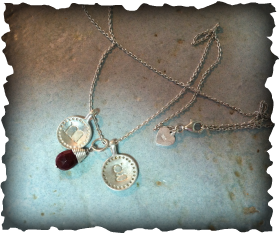 This beautiful necklace was a Christmas gift from my husband last year. It has our children's first initials and their birthstone. So every time I wear it I feel like I have my whole family with me. 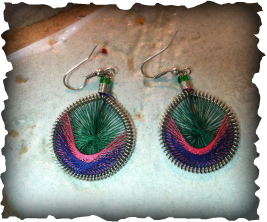 These earrings were a gift from my Mother. I love the colors, and surprisingly (or maybe NOT so surprisingly) they seem to "go" with a lot of my favorite clothes. I have gotten many compliments on them. I didn't wear them a lot right when she gave them to me, but now they are my favorites and I love thinking of her every time I put them on. 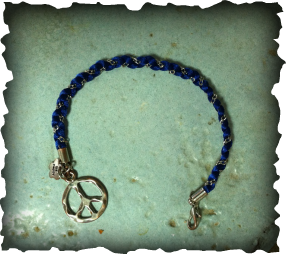 My sister gave me this cute little bracelet for my birthday this year. I know she thought of me because of: 1) the peace sign and 2) the color blue. I also love that it says "be happy" on it's little charm. She actually got me another gift (a tee-shirt) to give me the next time she saw me because the bracelet only cost $6. But to me that shows how something doesn't have to be expensive to be valuable. I love that she thought of me, I love that every time I put it on I think of our bond, and, in fact, I just plain love this little bracelet! 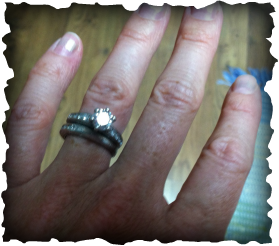 When I first started thinking about my talismans, I only thought of these three pieces. Then all of a sudden I though, "Oh my goodness, how could I forget my wedding rings??" But I think that this shows how we OFTEN take for granted the most important and steadfast things in our lives. I almost never take my rings off (good thing too, because I would probably lose them! Just ask Mike ;-) They are part of me just like Mike is part of me and my every day life. They go with me everywhere and are a constant reminder of his love. Do you have any special Talismans? Who or what do they remind you of and what are their powers? If you don't, can you think of something you might "make" into a Talisman?
I want to share some of the "building blocks" that I feel are essential to building a healthy, loving, and fun relationship with a child. These are some things that have worked really well for me.
1) Spend time with them. Quantity is just as important as quality. Of course when you are with them, really *be* with them too, but in order to really build a strong relationship you need to put the time in. In the case of small children this time may be spent with other adults that they are comfortable with present (ie their parents). You do NOT need exclusive time alone with them to build a relationship, in fact, the best way may be slowly and with others around. Don't wait for everyone else to leave. Also be open to spending time with the child on their terms, when it is good for them. Children have a lot less life experience than you do and are learning new things every day. They are sometimes tired, overstimulated, hungry, or just out of sorts and if you try to push your time agenda (ie when it's "good" or convenient for you), you may lose out. 2) Follow their lead. Watch the shows they like with them. Discuss afterwards. Color with them. Help them with their projects, but let them tell you how you can help. Listen. If they don't feel ready to do something but want you to do it instead - DO IT, don't pressure them to "do it themselves". Avoid correcting them but answer their questions directly if they ask (no "look it up!" needed). Read a book together. Bake. Play hide and seek or a board game. Watch them: do the monkey bars, swim, do silly tricks or make funny faces. Get excited about their new accomplishments and skills. 3) Don't take things personally. If they say no to an idea or an activity that's ok. If they are feeling shy don't push them to interact with you but keep trying and stay available so when they are ready, you are there. If they're having a hard time and say things that hurt your feelings try to remember that they are the child and you are the adult. Be honest with them but also own your own emotions and reactions. Apologize if necessary and accept their ways of apologizing. 4) Have fun! Kids are so good at playing... well, really they are great at plain old LIVING, and they have so much to share with us. It is so worthwhile to foster relationships with them and is beneficial both for you and the child, now and in the future. How do you build relationships with children in your life? Did I miss anything you consider crucial that you would like to add? Or do you disagree with some of my "building blocks"? |
Susan MayWife, mom, information and peace seeker. Categories
All
Archives
November 2023
|
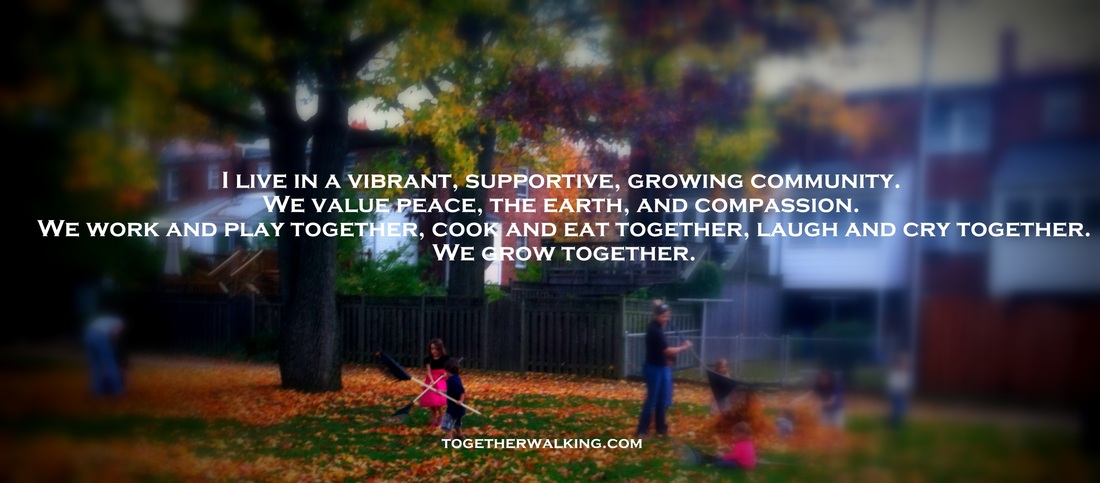
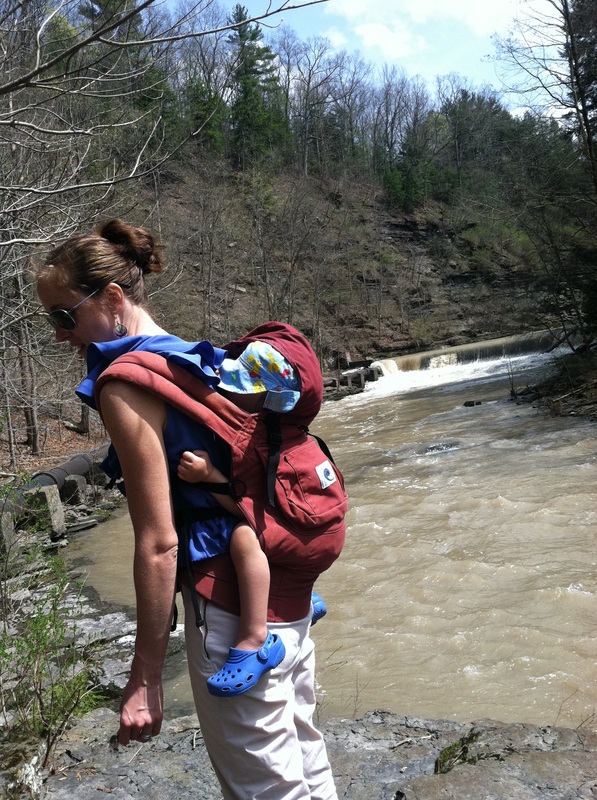
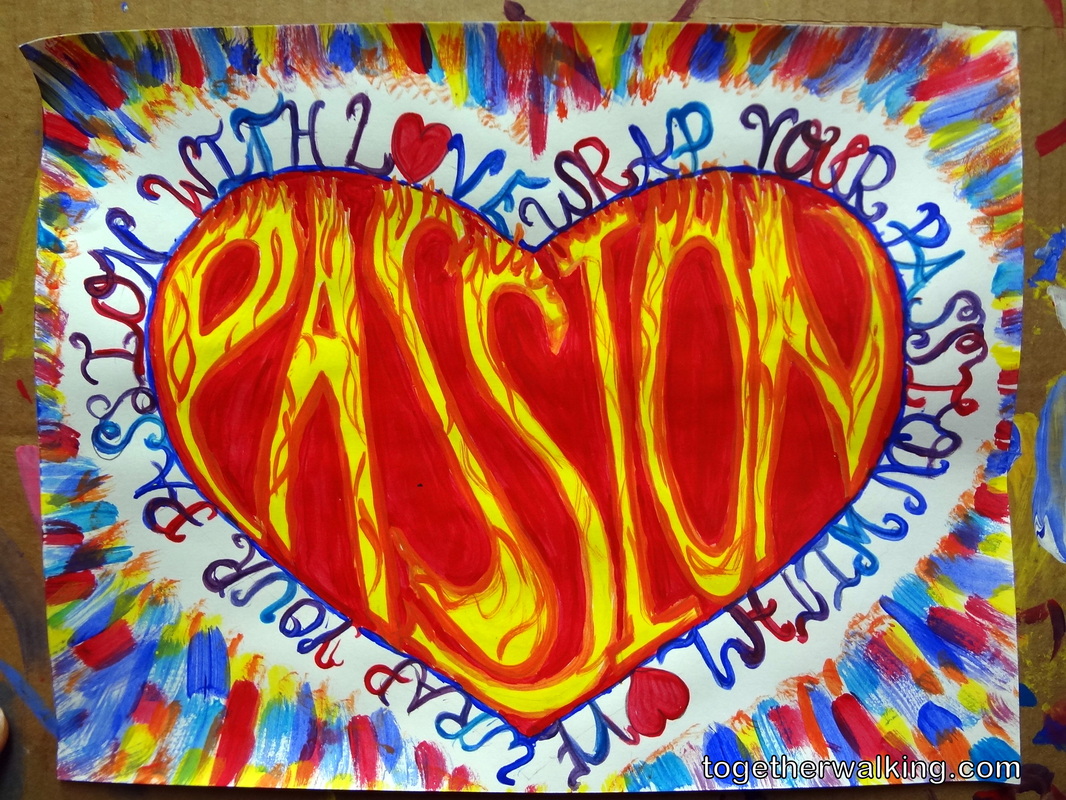
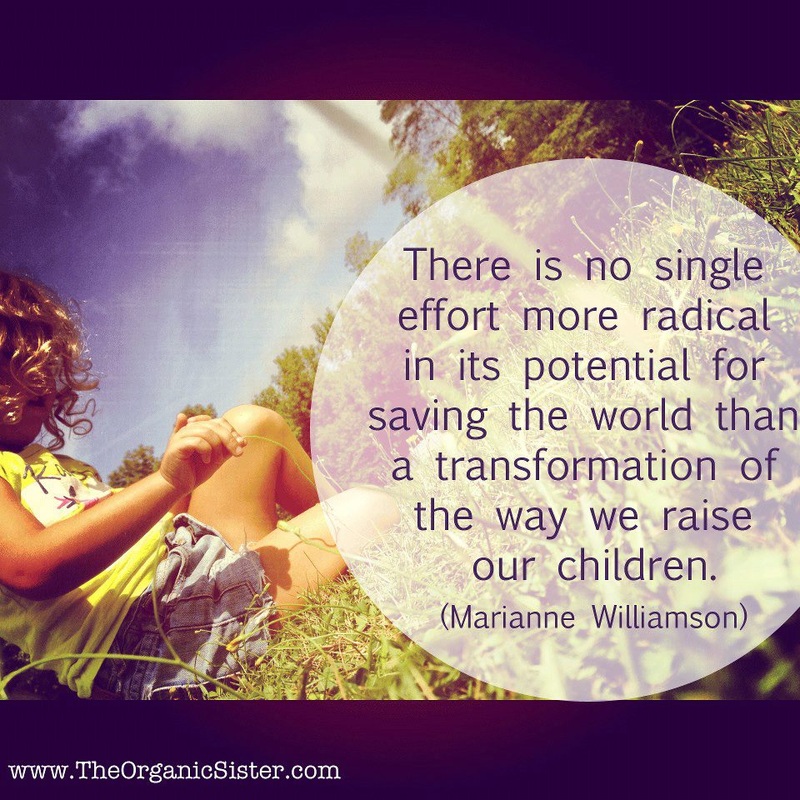
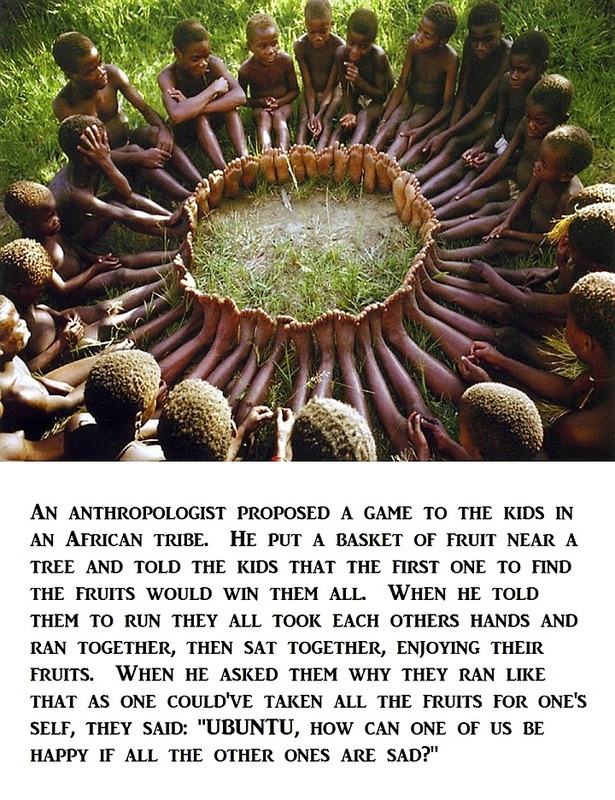
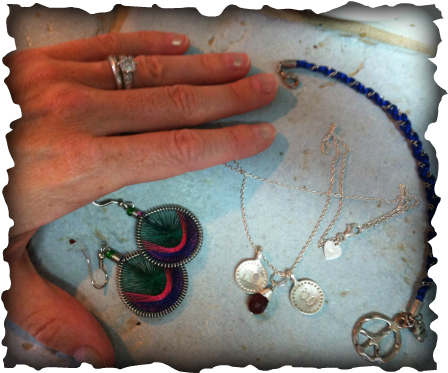
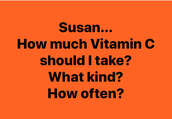
 RSS Feed
RSS Feed
